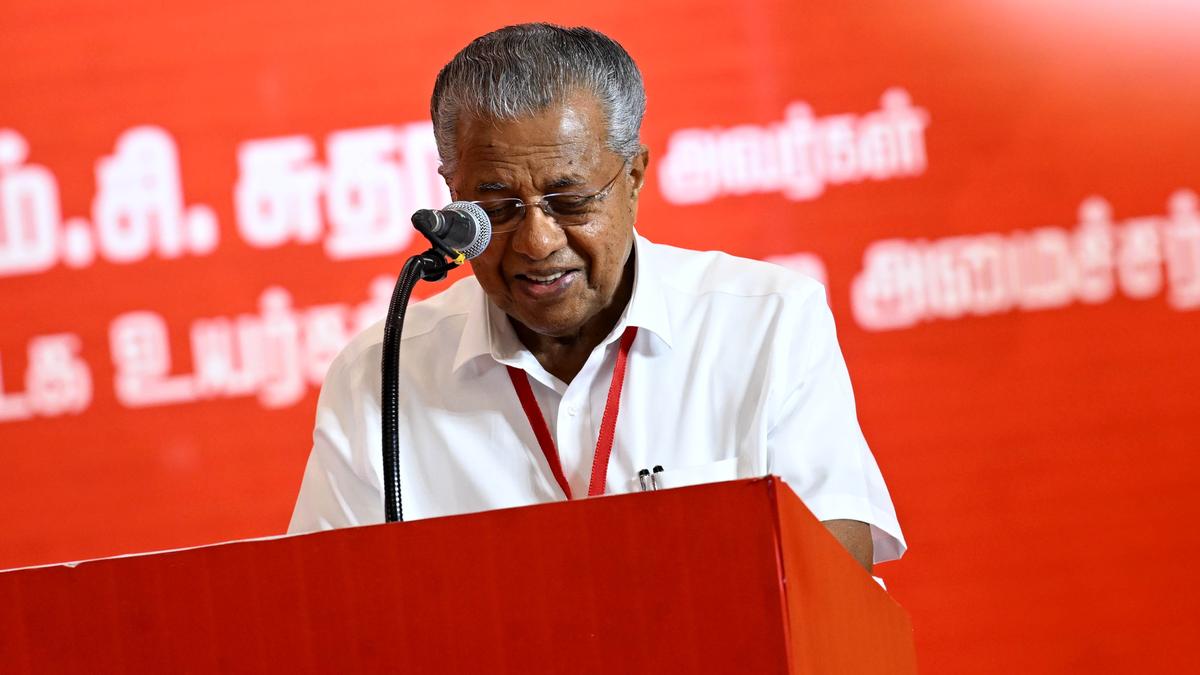
Kerala CM Pinarayi Vijayan flags ‘unitary’ polity, says Centre tightening grip on educational institutions
The Hindu
Kerala Chief Minister Pinarayi Vijayan discusses federalism, Article 356, and higher education issues at CPI(M) seminar.
Since the Indian Constitution was framed under abnormal circumstances, such as large-scale communal violence and bloodshed following Partition, the framers of the Constitution gave it very strong centralising features and emergency provisions. But the political scenario had become “more unitary in nature” even during these normal times, Kerala Chief Minister Pinarayi Vijayan said in Madurai on Thursday.
Addressing a seminar on “India’s strength is federalism” organised by the Communist Party of India (Marxist) as part of the 24th party congress, he stated that Article 356 was the most overused provision of the Constitution. Mr. Vijayan said its overuse had belied the hopes of the Chairman of the Drafting Committee of the Constitution, Dr. B.R. Ambedkar, that the Article would remain a dead letter.
He said many Opposition-ruled States had been at the receiving end of arbitrary action by Governors, who had no discretionary veto powers to exercise on the Bills passed by the Legislative Assembly, and the States were forced to move the Supreme Court.
Another issue was the ever-expanding Concurrent List that intrudes into the States’ legislative domain, he noted. “It is pertinent to mention that there is no consultation with the States when the Union government enters into international treaties which affect the States in a substantial manner, such as those pertaining to prices of farm products.”
Speaking on the influence of the Sangh Parivar on higher education institutions in the country, he said the BJP-led Union government was tightening its communal grip on many institutions which were largely formed through State legislations and substantially funded by the State governments.
Dr. Ambedkar in the Constituent Assembly spoke on the “limited scope” of Central authority in co-ordination and determination of standards of higher education. “But the present draft University Grants Commission Regulations attempt to totally exclude the State government from having any role in university matters like appointment of Vice-Chancellors,” he said.
As the State governments provide substantial funds to the centres of higher learning, they have a duty to ensure quality education and whether secular values were protected and scientific temper was fostered, Mr. Viajayan noted.

Four persons were killed and three others sustained injuries in a fire that broke out in a five-storey building housing several manufacturing units in Rohini Sector 5, the police said on Wednesday. Sixteen fire tenders were rushed to the spot after the Delhi Fire Services (DFS) received a call about the blaze at 7.30 p.m. on Tuesday. However, due to the combustible material stored in the building, including plastic and clothes, and the narrow lanes leading up to it, which prevented fire engines that ran out of water from giving way to other rescue vehicles, it took the DFS over 12 hours to douse the flames.





















 Run 3 Space | Play Space Running Game
Run 3 Space | Play Space Running Game Traffic Jam 3D | Online Racing Game
Traffic Jam 3D | Online Racing Game Duck Hunt | Play Old Classic Game
Duck Hunt | Play Old Classic Game










